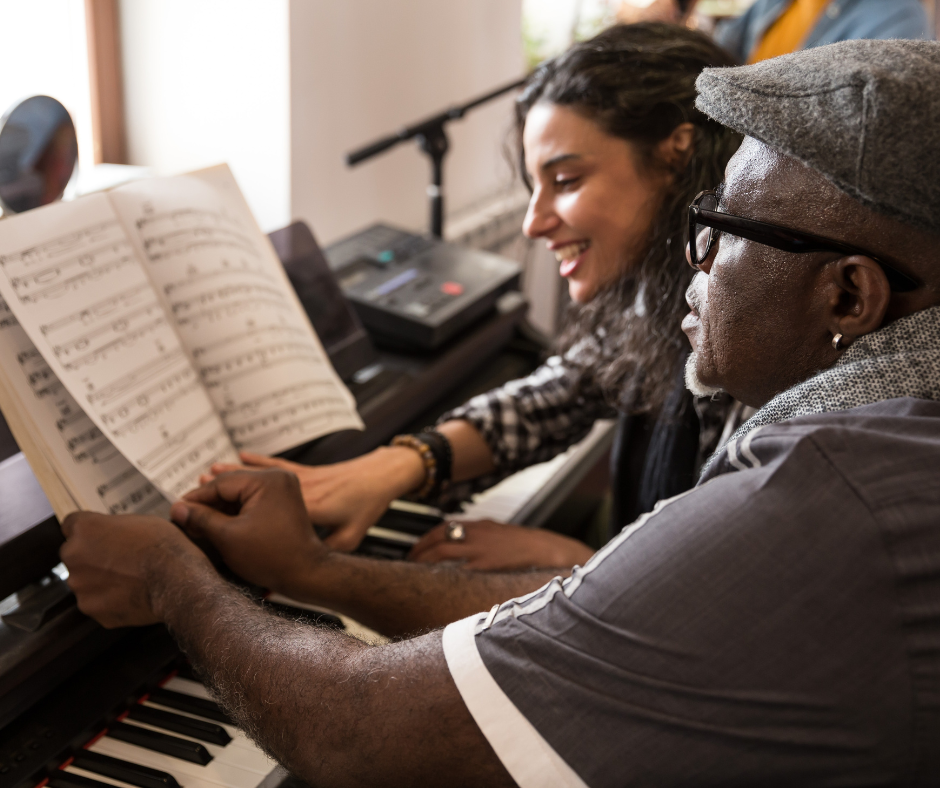Harmony in Healing: The Transformative and Healing Power of Music


Have you ever marveled at the ability of songs from our youth to evoke intense feelings of nostalgia and even bring back vivid memories of specific moments? Well, during puberty, the teen brain undergoes greater neural plasticity, creating a unique opportunity for the formation of powerful memories. The songs that deeply resonate with us during this period become imprinted in our memories for a lifetime.
Music itself can shape neural pathways and influence the choices and preferences of adolescents as they grow older. By stimulating the prefrontal cortex, music forms lasting emotional connections in our brains. Furthermore, the surge of hormones during this time intensifies emotions, solidifying these musical memories in our long-term memory cache.
Most of us loved music as teenagers and without realizing it, have probably been practicing musical self-therapy all of our lives! Music can calm us down, help us work through anger, release grief, or face feelings of guilt or shame that need to be seen.
What is Music Therapy?
Music therapy is a specialized form of therapeutic intervention that uses music to address the physical, emotional, cognitive, and social needs of individuals. Although their are “self-administered” music therapy methods, actual music therapy sessions are conducted by trained and certified music therapists who apply various musical techniques, such as listening to music, playing instruments, singing, and songwriting, to support individuals in achieving specific therapeutic goals.
Music therapy’s roots can be traced back to the “Stone Age” when various ancient civilizations and indigenous cultures, such as the Aborigines in Australia and certain African tribes, employed singing and musical group activities for purposes of prayer, celebration, and coping with challenging circumstances like droughts, floods, or extreme weather conditions.
This ancient connection between music and human existence has had a profound and enduring impact, shaping the essence of music therapy as we know it today.

Even the illustrious Ancient Greek civilization bears witness to its incorporation of music into daily life, believing it to be a powerful means of restoring peace of mind and body. Read more here.
Noteworthy figures like Plato and Pythagoras from Ancient Greece provide intriguing insights into how they utilized music to support and uplift their communities. Music education and awareness were actively encouraged as part of their approach.
“The highest goal of music is to connect one’s soul to their Divine Nature, not entertainment.”
— Pythagoras
Music has been an integral part of human culture for centuries, affecting our spirituality, moods and emotions, and influencing our overall well-being. Beyond its aesthetic appeal, music is now recognized for its therapeutic potential. Let’s look at the mental health benefits of music therapy and a few fun and therapeutic ways to incorporate music into daily life for enhanced well-being.
Some Powerful Ways in Which Music is Healing
Stress Reduction and Relaxation:
Music has a profound impact on stress reduction and relaxation. Research has shown that listening to calming music can lower cortisol levels, a stress hormone, and promote relaxation (Knight & Rickard, 2001). Incorporating music therapy techniques such as guided imagery or progressive muscle relaxation can further enhance the relaxation response.
Indeed, the impact of listening to this specific song “Weightless” was profound, leading to a remarkable 65 percent reduction in overall anxiety among participants. Additionally, their usual physiological resting rates experienced a significant 35 percent decrease as a result of this musical experience.
Cognitive Stimulation:

Music therapy has been found to stimulate cognitive functions, including memory, attention, and problem-solving skills. Engaging in musical activities, such as learning to play an instrument or participating in group singing, can enhance neuroplasticity and cognitive flexibility (Särkämö et al., 2008). Regular engagement with music can help maintain cognitive abilities and improve overall brain health.
To maintain a vibrant and engaged brain as you age, music proves to be an invaluable tool. Whether you choose to listen to music or actively engage in playing it, the benefits are extensive, offering a comprehensive brain workout. Numerous studies have revealed that music has the remarkable ability to reduce anxiety, lower blood pressure, and alleviate pain. Furthermore, it contributes to enhancing the quality of sleep, uplifting mood, sharpening mental alertness, and boosting memory functions. Embracing music as a part of your life can be a potent strategy for nurturing cognitive health and overall well-being.
Mood Enhancement:
Music has the power to uplift our mood and enhance emotional well-being. Engaging with music that resonates with positive emotions can stimulate the release of dopamine, a neurotransmitter associated with pleasure and reward (Salimpoor et al., 2011). Creating personalized playlists of favorite songs or exploring different genres can help individuals find music that boosts their mood.
Active music-making positively affects neurotransmitters, such as dopamine and serotonin, that influence mood. Dopamine influences focus, concentration, memory, sleep, mood and motivation. Likewise, serotonin impacts mood, sleep patterns, anxiety and pain. Active music-making can involve singing, playing an instrument or creating music electronically. Making music, specifically singing in a group, helps us feel connected to other people because of the production of the hormone oxytocin. Singing synchronizes breathing patterns to promote relaxation and reduce the hormone cortisol, “the stress hormone.”

Mental Health Support:
Music has proven to most of us to be a powerful ally in the realm of mental health, getting us through good and bad times alike, and helping us face our challenges. Engaging with music can be a source of immense comfort and solace for most people. And listening to uplifting melodies or relatable lyrics can boost mood, reduce stress, and alleviate feelings of anxiety or sadness. By tapping into the innate power of music, mental health is enriched, and individuals are empowered on their journey towards healing and well-being. Music therapy provides a safe and nurturing environment where individuals can explore their emotions, work through traumas, and build coping mechanisms.
Here is an excellent article about music therapy’s application in mental health, including its use with people on the autism spectrum. How Music Helps with Mental Health – Mind Boosting Benefits of Music Therapy
Emotional Expression and Processing:
Music therapy provides a safe and creative outlet for emotional expression and processing. Playing an instrument, singing, or even listening to music can help individuals explore and communicate their emotions effectively (Gold et al., 2009). Engaging in music-making activities, such as songwriting or improvisation, can facilitate emotional release and self-reflection. Music possesses the remarkable ability to influence our emotional state and well-being. Upbeat music can infuse us with feelings of optimism and positivity, uplifting our spirits and outlook on life. Conversely, slower tempo melodies have a calming effect, soothing the mind and relaxing tense muscles, thereby releasing the accumulated stress of the day.

Social Connection and Support:
Music has a unique ability to foster social connection and support. Participating in group music therapy sessions or joining community choirs or bands can provide opportunities for social interaction, reducing feelings of loneliness and isolation (Clift & Hancox, 2010). Collaborative music-making promotes teamwork, empathy, and a sense of belonging. Throughout history, music has acted as a universal language that transcends cultural, linguistic, and social barriers, bringing people together from diverse backgrounds and experiences. When individuals come together to create or enjoy music, they form connections that go beyond mere words, forging bonds that foster a sense of belonging and community!
Incorporating Music Therapy into Daily Life:
Incorporating musical therapy into your daily life can be a transformative and enriching experience, offering a wide array of benefits for your physical, emotional, and mental well-being. Whether you’re an avid music lover or new to the concept of music therapy, here are a few simple ways to harness the power of music in your everyday routines.
Create Personalized Playlists:
Compile playlists of favorite songs that evoke positive emotions or memories. Listen to these playlists during daily activities such as exercising, cooking, or commuting to enhance mood and reduce stress.
Engage in Active Music-Making:
Learn to play a musical instrument, sing, or dance to music. Active engagement with music stimulates cognitive functions, promotes emotional expression, and provides a sense of accomplishment.

Practice Mindful Listening:
Set aside dedicated time to listen to music mindfully. Focus on the sounds, melodies, and lyrics, allowing yourself to be fully present in the moment. This practice can promote relaxation and emotional well-being.
Join Music-Based Community Activities:
Participate in local community choirs, bands, or music classes. Engaging in group music-making activities fosters social connections, provides support, and promotes a sense of belonging. Learning, playing, growing, and expressing in community with other like-minded musicians deepens our experience and simply makes every life all the better.
Attend Music Festivals
Music festivals offer a myriad of exhilarating benefits that go far beyond just the joy of listening to live music. Firstly, music festivals provide a unique and immersive experience, creating a captivating ambiance that allows attendees to escape the mundane routines of everyday life and indulge in a world of vibrant sounds and creative performances. They offer a chance to connect with like-minded individuals who share a passion for music, fostering a sense of community and belonging. Moreover, these events often feature diverse musical genres and international artists, broadening one’s musical horizons and introducing them to new sounds and cultures. The festive atmosphere and energetic performances contribute to an uplifting mood, reducing stress and enhancing overall well-being. Ultimately, attending a music festival becomes an unforgettable and enriching journey that fosters lasting memories and leaves participants feeling reinvigorated and inspired.
Music therapy offers a range of mental health benefits, including stress reduction, mood enhancement, emotional expression, cognitive stimulation, and social connection. By incorporating music into daily life through personalized playlists, active music-making, mindful listening, and community activities, individuals can harness the therapeutic power of music to enhance their overall well-being.

Pavlicevic and Ansdell, 2004; Stige, 2002; 2003; Stige, Ansdell, and Pavlicevic, 2010; Stige and Aaroe, 2012.
– Clift, S., & Hancox, G. (2010). The perceived benefits of singing: Findings from preliminary surveys of a university college choral society. Journal of the Royal Society for the Promotion of Health, 130(6), 265-271.
– Gold, C., Voracek, M., & Wigram, T. (2009). Effects of music therapy for children and adolescents with psychopathology: A meta-analysis. Journal of Child Psychology and Psychiatry, 50(3), 393-415.
– Knight, W. E., & Rickard, N. S. (2001). Relaxing music prevents stress-induced increases in subjective anxiety, systolic blood pressure, and heart rate in healthy males and females. Journal of Music Therapy, 38(4), 254-272.
– Salimpoor, V. N., Benovoy, M., Larcher, K., Dagher, A., & Zatorre, R. J. (2011). Anatomically distinct dopamine release during anticipation and experience of peak emotion to music. Nature Neuroscience, 14(2), 257-262.
– Särkämö, T., Tervaniemi, M., Laitinen, S., Forsblom, A., Soinila, S., Mikkonen, M., … & Hietanen, M. (2008). Music listening enhances cognitive recovery and mood after a middle cerebral artery stroke. Brain, 131(3), 866-876.
| ReplyForward |

